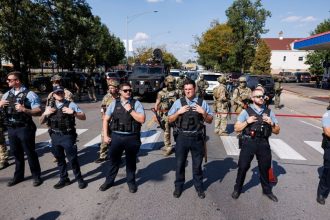Nov. 17 (UPI) — Former Prime Minister of Bangladesh Sheikh Hasina has been sentenced to death for crimes against humanity for the violent suppression of a student protest that killed as many as 1,400 people last year.
Hasina was tried in absentia by an international crimes tribunal that she created during her 15-year rule.
“Sheikh Hasina committed crimes against humanity by her incitement, order and failure to take punitive measures,” one of the judges said. Some of the victims’ families were in the courtroom for the verdict and applauded and cried when the sentence was announced.
The judges said it was “crystal clear” that she “expressed her incitement to the activists of her party … and furthermore, she expressed that she ordered to kill and eliminate the protesting students.”
Her former interior minister, Asaduzzaman Khan Kamal, was also sentenced to death.
Hasina released a statement after the verdict and sentence.
“The verdicts announced against me have been made by a rigged tribunal established and presided over by an unelected government with no democratic mandate,” Hasina said in the statement.
“I reject the ICT’s other allegations of human rights abuses as equally unevidenced. I am very proud of my government’s record on human rights and development,” she said.
The protests began in July 2024 against civil service job quotas for those who fought in the 1971 Bangladesh Liberation War against East Pakistan. The students wanted the jobs to be based on merit. But the protests turned into a call to overthrow Hasina. The incident is now called the July Revolution. It’s believed to have ended with 1,400 deaths and 25,000 injured.
On Aug. 5, 2024, Hasina fled by helicopter to India as crowds stormed her home. She has since stayed in India under protection.
Former police chief Chowdhury Abdullah Al-Mamun also faces charges. He pleaded guilty in July but agreed to testify against Hasina, so prosecutors agreed not to seek the death penalty against him, The Guardian reported.
In the days before the verdict, Dhaka, the nation’s capital, experienced a wave of political violence. Bombs exploded around the city.
Bangladesh’s next elections are scheduled for February. Hasina’s party, Awami League, can’t run in any elections.
India has ignored Bangladesh’s requests for extradition. On Monday, government officials in Dhaka asked the Indian government to “hand over these two sentenced individuals to Bangladesh authorities without delay.”
“This is India’s responsibility in keeping with the existing bilateral extradition treaty between both countries,” the Bangladeshi foreign ministry said in a statement.
India released a statement saying that it has “noted the verdict” regarding Hasina and will “engage constructively with all stakeholders. As a close neighbor, India remains committed to the best interests of the people of Bangladesh, including in peace, democracy, inclusion and stability in that country,” India’s Ministry of External Affairs said Monday.
Protesters responded to the verdict in different ways, CNN reported. Some went to the ruins of the home of former Prime Minister Sheikh Mujibur Rahman — Hasina’s father. They came with two bulldozers and said, “Break it down and burn it,” meaning the dynasty’s power. They also lit the street on fire.
Students at Dhaka University celebrated by handing out candy and organizing a rally for joy.
Golam Rahman, 55, the father of slain protester Golam Nafis said execution was “the only acceptable verdict for what was done to my child. We buried a boy, not an enemy of the state. Nothing will bring him back, but the truth has to be said in court.”
“We, the families of martyrs in the uprising, want to see her hanged as an example to future rulers,” The Guardian reported Rahman said. “Let no government think it can turn its guns on children and walk away.”









